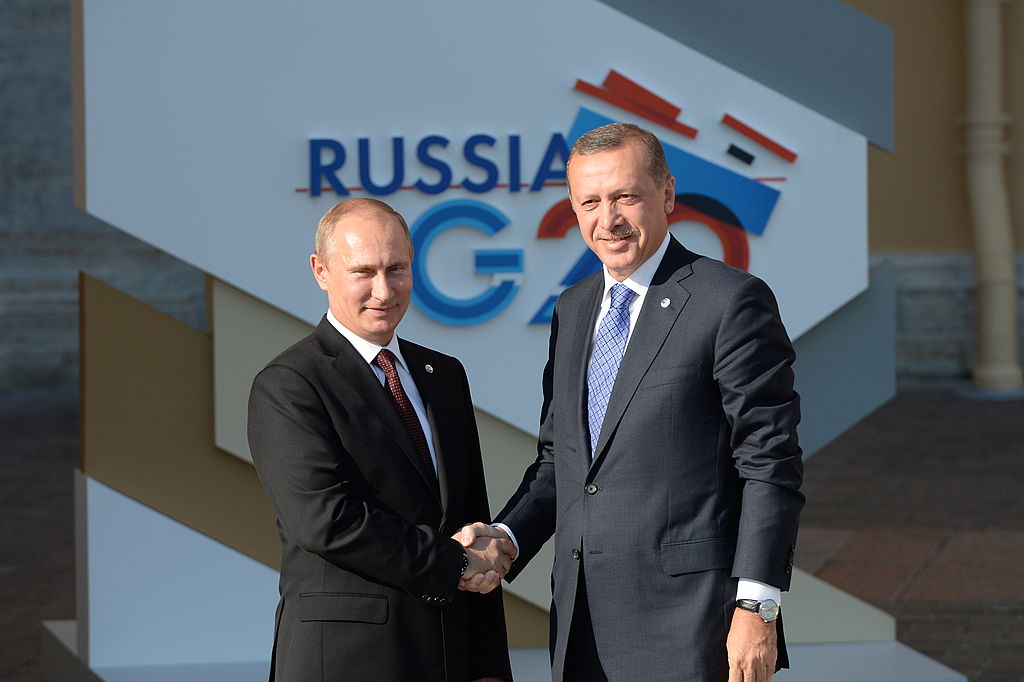Turkey apologizes for downing Russian jet last year, restores ties with Israel


A free daily email with the biggest news stories of the day – and the best features from TheWeek.com
You are now subscribed
Your newsletter sign-up was successful
On Monday, Turkey restored full diplomatic relations with Israel, a former ally estranged for six years, and apologized to Russia for shooting down a Russian fighter jet near the Syrian border last November. There are financial reasons for both acts of rapprochement: Restoring ties with Israel cleared the way for natural gas deals that will move gas from Israel to Turkey, and from Turkey to Europe; and Russian President Vladimir Putin had demanded the apology before he would consider lifting sanctions on the import of Turkish goods and exports of Russian tourists to Turkey.
Last Nov. 24, Turkish F-16s shot down a Russian Su-24 in the mountainous Turkish-Syria border area. The pilot was killed, and a Russian marine was shot dead in a helicopter rescue attempt. On Monday, Turkish President Recep Tayyip Erdogan sent Putin a letter apologizing for the downing and informing "the family of the deceased Russian pilot that I share their pain and to offer my condolences to them," according to a statement from Erdogan's spokesman, Ibrahim Kalin. Putin spokesman Dmitry Peskov added that "the letter states, in particular, that Russia is a friend to Turkey and a strategic partner, with which the Turkish authorities would not wish to spoil relations."
Turkish-Israeli ties were greatly strained after Israel launched a military raid in 2010 on Turkish aid ship the Mavi Marmara, en route to Gaza, killing 10 Turkish activists. Erdogan has since alienated Europe over his hardline on Syrian refugees and increasingly authoritarian policies, the U.S. over Turkey's attacks on Kurdish fighters aiding the U.S. to battle the Islamic State, and Iran by demanding the removal of Syrian President Bashar al-Assad.
The Week
Escape your echo chamber. Get the facts behind the news, plus analysis from multiple perspectives.

Sign up for The Week's Free Newsletters
From our morning news briefing to a weekly Good News Newsletter, get the best of The Week delivered directly to your inbox.
From our morning news briefing to a weekly Good News Newsletter, get the best of The Week delivered directly to your inbox.
"Turkey had been going through a deep sense of isolation for the past few years, having switched from its famous 'zero problems with neighbors' policy to a place where they had no neighbors without problems,” Asli Aydintasbas at the European Council on Foreign Relations tells The New York Times. "This was the loneliest point in the history of the republic — Qatar and Saudi Arabia looking like the government's only real friends." Erdogan is also dealing with a domestic insurgency and economic downturn, she added. "At the core of the decision to mend ties with Israel and Russia is an existential need for survival."
A free daily email with the biggest news stories of the day – and the best features from TheWeek.com
Peter has worked as a news and culture writer and editor at The Week since the site's launch in 2008. He covers politics, world affairs, religion and cultural currents. His journalism career began as a copy editor at a financial newswire and has included editorial positions at The New York Times Magazine, Facts on File, and Oregon State University.
-
 Political cartoons for February 21
Political cartoons for February 21Cartoons Saturday’s political cartoons include consequences, secrets, and more
-
 Crisis in Cuba: a ‘golden opportunity’ for Washington?
Crisis in Cuba: a ‘golden opportunity’ for Washington?Talking Point The Trump administration is applying the pressure, and with Latin America swinging to the right, Havana is becoming more ‘politically isolated’
-
 5 thoroughly redacted cartoons about Pam Bondi protecting predators
5 thoroughly redacted cartoons about Pam Bondi protecting predatorsCartoons Artists take on the real victim, types of protection, and more
-
 Nobody seems surprised Wagner's Prigozhin died under suspicious circumstances
Nobody seems surprised Wagner's Prigozhin died under suspicious circumstancesSpeed Read
-
 Western mountain climbers allegedly left Pakistani porter to die on K2
Western mountain climbers allegedly left Pakistani porter to die on K2Speed Read
-
 'Circular saw blades' divide controversial Rio Grande buoys installed by Texas governor
'Circular saw blades' divide controversial Rio Grande buoys installed by Texas governorSpeed Read
-
 Los Angeles city workers stage 1-day walkout over labor conditions
Los Angeles city workers stage 1-day walkout over labor conditionsSpeed Read
-
 Mega Millions jackpot climbs to an estimated $1.55 billion
Mega Millions jackpot climbs to an estimated $1.55 billionSpeed Read
-
 Bangladesh dealing with worst dengue fever outbreak on record
Bangladesh dealing with worst dengue fever outbreak on recordSpeed Read
-
 Glacial outburst flooding in Juneau destroys homes
Glacial outburst flooding in Juneau destroys homesSpeed Read
-
 Scotland seeking 'monster hunters' to search for fabled Loch Ness creature
Scotland seeking 'monster hunters' to search for fabled Loch Ness creatureSpeed Read
